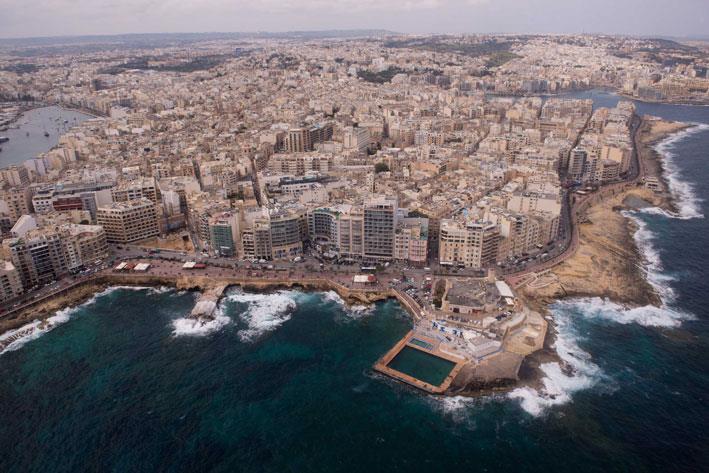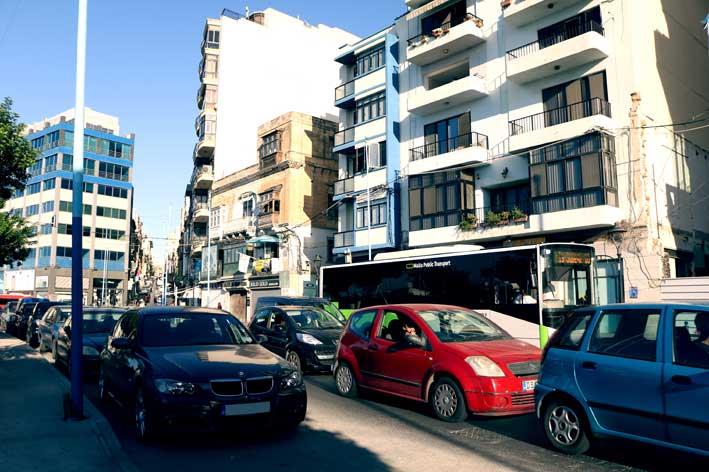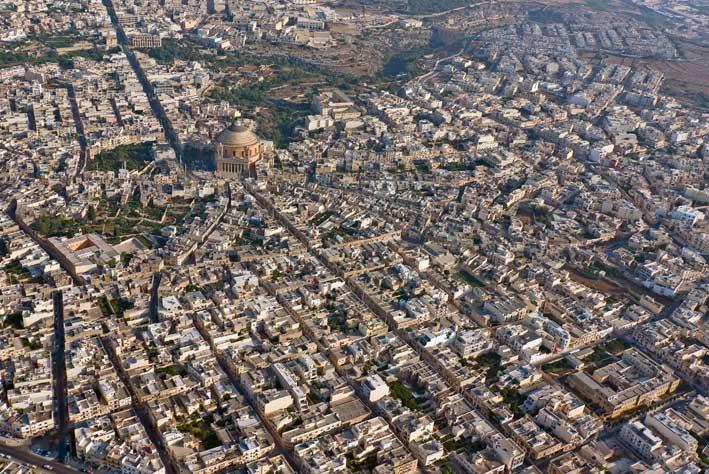Sociologist and Sliema local councillor Michael Briguglio would not give the Planning Authority (PA) a passing grade, stressing that it has failed in concept as those sections which voice environmental and local concerns are not given a strong enough voice.
“On paper various policies are there and others can be improved. It fails, however, in looking at holistic solutions. I don’t see genuine dialogue in the policy process,” he said.
While not being against development if done sustainably, overdevelopment is a serious concern for the environmentalist, who highlighted a number of issues including the lack of open spaces within localities, as well as the lack of planning leading to dispersed high-rise buildings which could be seen as sticking out amidst masses of buildings.
Has the environment been given a stronger voice since the creation of the Environment and Resources Authority?
No. The Environment and Resources Authority (ERA) is understaffed and under-resourced. It is not powerful enough. The ERA should be as strong as the Planning Authority, not just one voice that the PA must consult. It also doesn’t have enough personnel for research and inspection.

Some say local councils have been given more power through a seat on the Planning Authority board…
I disagree, the seat on the board is symbolic. It’s one vote amongst many. Local councils should have a strong say in the consultation process as they are the elected representatives of residents. Their stake should be better weighted. To be fair not everything is ignored, but when local councils push forward concerns on matters such as traffic and on waste, often these are not really taken into consideration. Local councils should not be side-lined, and should be empowered.
In the policy making process, councils should also be given a stronger say. In a number of situations local councils are directly dealing with day-to-day matters that may not be appreciated by all PA board members. For example, currently there is the issue of restaurants with platforms for tables and chairs removing parking spaces.
If you had the power to reform the PA, what would you do?
I would give the ERA more resources and a greater say on the PA boards. I would give more strength to local councils, both in terms of policy making and specific local developments. If a council shows grave concern on transport issues for example, there should be a mechanism where such concerns are given more weight. Councils deal with residents on a daily basis. There also needs to be more transparency, and the PA should not act as a rubberstamp.
One of the main arguments in the Townsquare project appeal, is that the PA rubberstamped reports it was given. The social impact assessment was flawed, and it was ten years old. The PA should go through such reports thoroughly. The consultation and planning process should not be seen as a formality.

Do you believe Malta is in a property bubble?
Yes. Malta is becoming over-reliant on this sector, resulting in higher rents for residents as well as other social and environmental impacts. Paradoxically, If demand for rented property drops, and we know much of the demand comes from foreigners coming to reside in Malta mainly for employment reasons, then the property bubble may crash to the detriment of thousands of people and financial institutions who invest in property and to workers involved directly or indirectly in this sector. The property sector is so big that if the bubble implodes, that can have severe impacts not only on developers, but on a whole range of economic sectors.
Malta needs a more sustainable economy which diversifies and does not rely too much on one sector. Government’s strategy is producing growth right now, however it’s like we have an economy on steroids, like driving a car without brakes. Yes when so much construction occurs there will be jobs and there will be a multiplier effect, but this cannot go on forever. It is about time to start speaking about diversifying the economy.
This is just the economic aspect. People are becoming more environmentally aware of their quality of life, the impact of traffic etc. There is also the social aspect – we are running out of areas where people can go in order to enjoy their free time. Malta is a building site. Many of us are giving too much credit to government on the economy. Yes we have good figures, but what is good in the short-term is not necessarily good in the long-term. We are too dependent on one economic sector.

What social problems exist due to the current development boom?
The price of rent is a major issue. A lot of developers bank on foreigners coming to work in gaming and other sectors, ready to pay high rent prices, and thus the rent prices go up which is a huge issue for residents on low income.
There are other factors. Do we want a situation where we have enclaves of the ultra-rich who ghettoise themselves in upper-class residences? Are we giving enough importance to the social fabric of local communities? In Qui-Si-Sana and Tigne, where high rise building is being proposed, there are communities of people who have lived there for years feeling that their voices are not strong enough. When looking at such massive development, we must look at the social fabric of the localities which cannot be measured in financial terms, but can be analysed in social terms to see what mitigation measures could occur, and having holistic consultation processes with residents amending plans if needed. This isn’t an anti-development approach, but a more holistic and democratic one.

Can Sliema and St Julian’s, considering traffic is basically at a standstill, take further development in any form? If yes what can be done to alleviate the problem?
I am not anti-development, I am for regulated sustainable development. The government seems to have very little concern for alternative modes of transport. The Sliema local council is studying alternatives for further bicycle use and we were awarded government funds for this. But looking at the infrastructure and the way government plans, government doesn’t seem to be very concerned with bicycles and pedestrians.
We need to place importance to residents’ rights. In Sliema for example, we don’t have a residents parking scheme, while other localities have. It is time for government to look into serious proposals being made by local councils. It is also time for all new developments to have sufficient parking spaces.
Another issue is locality car parks. They are under government control. Why shouldn’t they be devolved to local council control, so that at funds generated could go to the council which in turn can use these funds for sustainable transport schemes. In Sliema, together with SOS Malta, we have introduced a scheme to transport elderly persons around Sliema. Local councils can invest in their own public transport schemes which alleviate the need for car use, however for such schemes councils need funds.Local councils also need more power. When speaking of development, there is a concentration of power within the Planning Authority but there is a deficit of power when it comes to local councils.

What is your opinion about open spaces within localities on the island?
On a positive note it is great that Malta is discussing public domain, and it will hopefully be a success. However, government lacks appreciation for open spaces, and it seems that every open space needs to be commercialised or taken up by the private sector.
When looking at beaches, their main purpose should be for public enjoyment and recreation. Government’s mind-set is that public space can be exploited for private gain. I’m not saying the private sector cannot participate, and local councils could work with private entities to embellish areas and introduce voluntary facilities. But having a fully commercialised area, practically having to pay to swim, it’s a different situation.
Open spaces help build strong resilient communities. If we want more social cohesion and integration, we need more public spaces. Sliema and St Paul’s Bay have large foreign populations, which I think is quite good. However, there are issues of integration and having areas where people can interact is helpful, and builds trust, social capital.

The Paceville Master Plan seems to be on the back burner at the moment, but what do you think needs to change in order for the plan to become acceptable?
I believe we need a national master plan to identify impacts on other localities and to identify the purpose of this development. As it stands, it looks like a massive exercise of speculation on public land. If it were me, I would go back to the drawing board. I believe the plan has been shelved as it was so unpopular.
When speaking of massive development on a small island we need a holistic vision on transport and open spaces. If Paceville is developed as it was proposed, it will have an impact on other areas as well. Some developers would argue that there is a demand, and that it would be good for the economy, but is it the best option to focus most of our economic decision making on development and construction?
What about the visual impact of massive developments, what effect would it have on tourism and on the Maltese people, if any?
Visual impact is subjective. It is disturbing to see photomontages of a highrisemushrooming the rest of the skyline, looking like phallic symbols. There is no holistic plan and the PA looks at them as one-off proposals. Next to Townsquare there is Fort Cambridge. Holistically it wasn’t taken into account. We need to take a step back and see whether this is the way forward. What is visually ugly or appealing is very subjective. The photomontages of Sliema and Gzira look like something out of the third world, where there is a mass of buildings and suddenly something cropping up in the middle. Is this the kind of planning we really have?